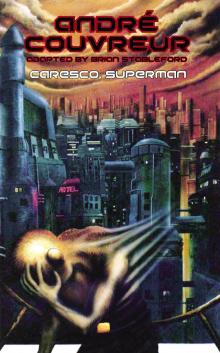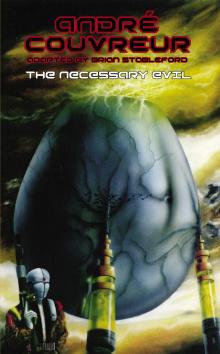- Home
- André Couvreur
Caresco, Superman Page 7
Caresco, Superman Read online
Page 7
He passed his fingers through the tangle of his beard, pulled up his fugitive trousers, and then shrugged his shoulders. Finally, addressing himself to Marcel, he said: “Well, my dear friend, we have only to let ourselves live and await events. Let our souls be tranquil in the constancy of wisdom. Let’s take a bath first. That basin tempts me; I’ve always regretted only having a cracked tub for my usage, which meant that I could only plunge my body into it in fractions. Afterwards, we’ll dine, for it will be time. By the way, child, I don’t see a clock. What time is it in your country?”
The child did not seem to understand. The professor was obliged to repeat his question before obtaining a reply.
“The time? Yes, indeed, I know what you mean, Monsieur. The hours of the day don’t exist here; only the engineers know and observe them. Even the difference between day and night is often so scarcely evident that it is usually of no interest. Those are superfluous preoccupations, which the Superman has removed from our lives. Let us thank him for taking away all those paltry anxieties, in order to let us think only about amour.”
So saying, he accomplished an indecent gesture that caused Choumaque to swell up with holy wrath and take hold of the child by the ear in order to correct him.
“Wretch! Don’t you have any respect for me fifty years? Do you know that I’m going to throw you out of the window?”
Mirror-of-Smiles was utterly nonplussed. That reprimand for an act of simple politeness confused him. Was his life not made up of obliging offers to all comers? He was on the point of weeping—and it would have been the first tear that he had ever shed. His beautiful blue eyes, whose gleam was eloquently underlined by dark rings, expressed his astonishment and his sadness.
Choumaque understood the protestation, and suddenly softened.
“I forgot that we’re no longer living in a country where morality is dominant in appearance. Go on, child, don’t worry! I won’t eat you today. Cruelty is a vice contrary to the essence of man; it’s unworthy of a soul imprinted with mildness like mine. But I’ll slap you if you permit yourself such manifestations again.”
“With great pleasure, Monsieur. Believe me, I was not acting with a view to my personal amusement. I was obeying, as it happens, the natural duties of my functions, for I am marked by the finger of Caresco. The red line that I have there on my tunic, and underneath it too, indicates that I’m gelded, and by virtue of that fact, destined to servitude. I began very young, at the age of my puberty, utilizing myself for the pleasure of others. Certainly, I experience some satisfaction therein myself, and it would have been the best time of my present life, since, as soon as my chin is covered with a beard—which is still rare—I shall become entirely a slave. I don’t complain, because I know that the future life will compensate me.”
“Ah—you believe in a future life?” Choumaque queried.
“Yes, Monsieur; our religion informs us of it. I believe in metempsychosis and ulterior compensations. I’m a giton at present; later, I shall be a slave, but what does it matter, since, after my death, I shall live again and become a complete man. My successive lives will lead me toward perfection.”
“That,” said Choumaque, “is a reassuring morality, in sum, not far removed from our Christian dogmas, setting aside the question of lubricity—and, I dare say, not far removed from my doctrine of equilibria. This Caresco seems to me not to be devoid of a certain ingenuity. You can retire, little philosopher, and let us take our bath without you.”
“In that case, Messieurs good night. I shall go to bed. The pleasures of the fête and the tenderness of my sister Carabella have tired me out. May Caresco favor you, Messieurs!”
He disappeared, after turning a cartwheel, leaving the two voyagers very surprised by his agility and his social role. Their astonishment dissipated, however, before the imminent satisfaction of relaxing their limbs in the warm water, which a delicious unknown perfume rendered even more captivating.
Marcel shut himself in his apartment, similar in all respects to that of his former professor, and Choumaque, left alone, got undressed.
CHAPTER V
Scarcely had Choumaque stepped into the basin than the rock that constituted its frame sank downwards and narrowed, surrounding him on all sides, to the point that the poor man, his Stoicism being put to a severe proof, thought that he was about to be crushed.
“Alas, I’m going to die here, trapped!”
He was not; the rock circumscribed him just sufficiently to allow him to breathe. At the same time, artificial arms emerged from anfractuosities, equipped with soaped brushes that set about scrubbing the bather energetically in every part of his body, while showers that were successively hot and cold, coming from above, rid his greasy skin of the scoria that fifty years of transpiration had accumulated there.
When the initial panic had passed, Choumaque understood that this new manifestation of mechanical genius had no other effect that replacing human effort. He marveled at it, lending himself obligingly to the cleaning process. When he was finally thoroughly desquamated, the arms were folded back, the rock parted, and resumed its decorative impassivity. The water became pure again, warm, perfumed and transparent. He stayed there for a long time. His pink flesh felt a great wellbeing therein.
“Decidedly,” he said, aloud, “thus far, I don’t regret the voyage. These almost-supernatural comforts have their charm. But let’s wait and see what happens next.”
“What happens next will content you even more than the commencement,” pronounced a voice behind him.
He turned round, and his first movement was a gesture of frightened modesty, when he observed the presence of a woman who had come in without him suspecting it. She was presently sitting on the bed, looking at him and smiling.
She was tall, rather full-figured, with a fresh complexion, her nose strong and her lips carmined beneath opulent brown hair. Her entire body was swathed in an exceedingly light mauve peplum, secured at the waist by a golden cord. Her age was indefinable, so impressed was she by the curious mixture of youthfulness and age that Choumaque had already observed in the Chief Representative Zadochbach. Two red stripes, embroidered on the silk of her costume at the level of the abdomen gave her a hierarchical importance.
“Don’t you recognize me, Zéphirin?” she said, getting up and coming toward him.
“Recognize you? Forgive me, Madame…you must be mistaken…” stammered the philosopher, covering with his hands the part of his person that the morality of sculptors, in his own country, protected with a fig-leaf. Then he added: “But in order to permit me to gather my thoughts, deign to pass me my undershirt.
“Do you stand on ceremony nowadays?” the strange woman asked, still advancing toward the bath. “You weren’t so shy thirty years ago, my dear Zéphi.”
“You said Zéphi? Only one woman ever charmed me with that abbreviation.”
“Well, I am that woman.”
“You’re making fun of me, Madame, and the joke is particularly cruel at the moment when I only have the transparency of water to defend myself from your gaze. The mistress who called me Zéphi, and who called herself Little Panade10—the mistress of whom I conserve the most tender memory, in spite of her perfidies—was thirty years old in 1920. Her habits of drinking and amour, combined with the numerous beatings that she received from her lovers, made her a woman already mature at that age, while you have the appearance of being in your prime. Besides which, she had no teeth, whereas you possess all of yours; and the chestnut color of her sparse hair showed through at the roots of her badly-dyed red hair. Yours is brown and abundant.”
“What does that prove, Zéphi, except that someone has made another woman of me? Let’s see—do you require memories? Do you remember the little kitchen the size of a pocket handkerchief, next door to the room you had then, where I fried you garlic in sauces—because you loved garlic. It’s a taste you’d acquired from your friend, the painter Marius, who was from Marseilles...
“Do you rememb
er your rivalry and your quarrel with the best of your comrades when he put such an insistence into courting me that I was obliged to give in to him? Do you remember how angry you were when you caught us both in your bed? You had nothing left, at that time…oh, how great our poverty was! And were we not obliged, in order to live, to steal the milk and bread that the suppliers left at the other tenants’ door, for two months?
“You had nothing left, I say—not even a chair with which to hit your rival—and you were reduced to taking his clothes, and mine…for under the covers we were as naked as chrysalides—and throwing them out of the window. Our things landed on the head of a policeman on patrol. He came upstairs while you made yourself scarce, was received by us in that simple apparel, and brought us up on a morals charge...”
“Those are details that you might as well have obtained from another, Madame. They don’t prove that you’re Little Panade.”
“You want more precise details? Well, listen. Do you remember…?”
She leaned closer to the philosopher and murmured a few words in his ear that suddenly made him straighten up, with an indescribable emotion.
“Ah! This time, it’s no longer permissible for me to doubt! This tends to the marvelous! To quit a woman almost old, and find her again thirty years later, forty years younger! Come on, my girl, now that I look at you carefully in the light, I recognize the once-cherished features! It really is you. That’s your charming smile, with more teeth. Those are your eyes, more serious, with fewer crows’-feet, even if that’s no longer your hair! Might you be her daughter? But no, Little Panade was incapable of having children, having been dispossessed of her ovaries by the same Caresco that governs us at this moment. How can this be, by Seneca?”
In his emotion he had emerged completely from the water, and was cavorting on the parquet. The crown of his tousled hair, his fat shoulders, his thick torso, his abdomen hanging in numerous creases down to his shirt hairy thighs—his entire anatomy, in sum—was streaming with perfumed water. He had forgotten his nudity.
She enveloped him carefully, in order to dry him, in a thick violet peignoir that had been lying on a chair, and then drew him gently toward the bed, on which they sat down in order to chat.
“How can this be, Zéphi? It is, in reality, incredible. I want to tell you about it, for I have a few moments to devote to you. After the scandal that your rage caused, I spent two months in prison. I left the cell desperate, because I loved you—don’t protest, I loved you! You’d never understood that the gifts of the body and those of the heart are two very different things, and that one can share the former while jealously guarding the latter for a dear friend. You’ll see how that distinction reigns in this realm.
“I’ll go on. So, I found myself on the street, without a sou, wondering whether I ought not to go step over the parapet of the great river that runs through Paris, when I remembered the generosity that Caresco had always shown toward me. Yes, I ought to say that my surgeon had been a benefactor for poor Little Panade. Before I knew you he had fished me off the sidewalk, in the most absolute deprivation, almost dead of the disease that was undermining me. He took me to his clinic to operate on me gratuitously, and when I was better, he even went as far as to give me money to live honestly. I had, in exchange, to come and display myself from time to time, to sing his praises and recount to the numerous acquaintances I made the treasures of pathology that he had found in my abdomen. I was his debtor, and I paid him in moving publicity. Very badly, moreover, for at the end of three months, that honorable life weighed upon me to the extent that I threw my obstetric girdle to the winds, to fall into your arms!
“In brief, I recalled all that before deciding to die, and, wanting to try his generosity, I went to ring the doorbell of his clinic. I found everything in disorder, without a single patient. The surgeon’s instruments were being packed up for a great voyage; the operator was going abroad. The sisters in white head-dresses were weeping desperately as they made up the parcels. I understood then that all hope was lost for me.
“I was already going away, heart-broken, along the cold and silent street, thinking about my imminent bath, when I suddenly saw a man coming toward me, who seemed slightly mad and was making wild gestures. A client! I thought—but no, it wasn’t a client; it was Caresco. On seeing me, he stopped gesticulating and seized me by the arm. ‘Is that you, Little Panade? I’ve been looking for you...’
“I thought at first that he was joking, but the satisfaction that suddenly appeared on his face told me that he wasn’t. In any case, the propositions that he immediately made to me explained his contentment. It was thirty years ago, and I remember the whole of that scene as if it were yesterday. Having taken me to a wine-shop and comforted me with a glass of eau-de-vie, to which he added a few drops of a liquid he was carrying on him, he turned me around several times, inspected my teeth, my throat, tested the reflexes of my pupils and the slackness of my breasts.
“‘You can still do the job,’ he said. ‘Your anatomy is suitable; I’ll patch it up. Besides which, the science of prostitution and your lubricious tastes are the surest guarantee of perfect service. I’m taking you with me. Is that agreeable to you?’
“‘Where do you want to take me?’ I asked him, stupefied.
“‘It doesn’t matter. I’ve always been good to you, and I want to continue to be, even though you didn’t keep your promises to me.’
“He veritably magnetized me with his dominant gaze and voice. Anyway, I didn’t hesitate; I accepted immediately.”
“Then what?” asked Choumaque, prodigiously interested.
“Then, ballasted by a further sum of money, which permitted me one last imperial blow-out—he gave me just enough to make sure that I’d be poor again the next day—I embarked with him for an unknown destination. It was here that we landed. The land was deserted and chilled my heart, but soon, palaces rose up and five hundred magnificent couples moved into them. A few years later, those couples, aided by a few precious recruits, had founded a beautiful people submissive to the autocratic government of Caresco, who became the Superman. That’s it. You know as much as I do.”
“But what was your role in that society? This renewal of the flesh—how was it carried out?”
“My role? My new youth?” She got up from the bed, very proudly. Choumaque noticed the definite preeminence of her breasts, once so dejected by lassitude. “I won’t say anything about my new youth, Zéphi, because, for one thing, I don’t know anything about the methods employed here to return worn-out bodies to their primary vitality. It’s up to the engineers and the physicians to explain all that. Me, I simply submit to their practices, to their secrets—and as you can judge, I wear my sixty-two years quite well, without being rejuvenated.
“As for my role, Zéphi, there’s none more enviable, nor more highly honored. I’m the High Priestess of the Courtesans. I’m the one who teaches them the science of amour, of which, no doubt, you’ll experience the benefits in due course. I employ all my days in that, and sometimes my nights. There’s an entire technicality of sensuality that society is wrong to ignore. Marjah and I—Marjah is my colleague, the High Priest of the Gitons—have renovated that art, fallen into desuetude since the fall of Byzantium and the proscription of the Kama Sutra. We have recovered the precepts of those remote epochs, combining them with the resources of our imagination and the precautions of scientific hygiene. The Superman is also one of the pioneers, and not the least, of that religion of Pleasure, which he has instituted in parallel with the religion of Life.”
“Of Life?”
The High Priestess suddenly became serious. Her face lit up, and directed an almost mystical gaze toward the heavens. Her hands came together in a devotional manner. “Ah! That’s where it’s necessary to admire the renovating genius of the Superman! Have you, Zéphi, who were, as far as I can remember, a philosopher…?”
“A Stoic. I invent invented the doctrine of equilibria...”
“Have you, who
were also an observer, never noticed that all human miseries derive, not from the inherent wickedness of the creature and the social evils that result therefrom, but from the maladroit fashion in which humans are created, arriving in the world charged with a heavy burden of hereditary defects, faults and unhealthy atavisms? No, you’ve never noticed that?
“Well, Caresco has taken aboard those ideas—and that’s why he has perfected life in his realm, by only permitting beings to enter the world provided with perfect health. That’s why he has edified, as well as a religion, beneficent creation—and all of us admit and respect his dogmas, with the result that if our people is happy, it’s not only because they’re rich and abundantly satisfied in all the needs of existence; above all, it’s because they’re healthy, because they’re born… eucrasic!”11
“How admirably you preach, little girl! I no longer recognize you.”
“Don’t be astonished,” said Little Panade, resuming her roguish expression. “I’ve just been reciting our catechism. But anyway, I can’t tell you too much. You’ll judge for yourself, in due course. And you’ll admire our beautiful civil organization, at the same time as you taste the pleasures of the religion I teach…my Zéphi!”
Choumaque had got up in his turn. The conversation, the comments on amour, the ancient flesh of his one-time mistress, which had become a new flesh, the heady perfume that she was wearing, all combined to inflame him. He drew nearer to the High Priestess, his eyes confessing his desire.”

 Caresco, Superman
Caresco, Superman The Exploits of Professor Tornada (Vol. 2)
The Exploits of Professor Tornada (Vol. 2) The Necessary Evil
The Necessary Evil The Exploits of Professor Tornada (Vol. 3)
The Exploits of Professor Tornada (Vol. 3)